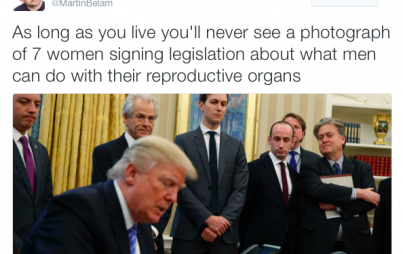
Photo courtesy of Wikimedia.com
While trans stunner Andrej Pejic's recent coming out party was met with general adoration—celebrated with not one but three "exclusive" magazine stories dedicated to her surgery story—the majority of trans Americans are still suffering at the hand of misinformation and crippling ambiguity regarding health care coverage.
Yes, there are signs of progress. The Affordable Care Act explicitly prohibits discrimination based on "the ground of race, color, national origin, sex, age," and the Department of Human Health and Services has gone on record (in 2012 no less) stating that:
Sex discrimination prohibition extends to claims of discrimination based on gender identity or failure to conform to stereotypical notions of masculinity or femininity and will accept such complaints for investigation.
Just two months ago, the U.S. Department of Health and Human Services repealed a 33-year-old ban that prevented Medicare from even considering the coverage of transgender healthcare (namely gender reassignment surgery).
Yet while things seem to be moving forward, and transgender folks are ostensibly unambiguously protected by Section 1557, the law has actually proven to be rather muddy. Each state must determine exactly what "discrimination" means and how best to tackle a society that's rapidly evolving before their eyes. And as per usual, the bureaucracy surrounding said legislation is often paralyzing to progress—culturally, economically and otherwise.
Bottom line: Sweeping measures to protect the 700,000 U.S. citizens that identify as trans continue to be hampered. (And frustratingly complicated.)
A Brief Rundown of Trans Laws
Just this past June, Massachusetts became the third state (joining California and Vermont) to offer mandatory coverage to low-income and disabled people (the crux of Medicare) and just five days ago, Maryland joined Oregon and California in offering state employees and retirees said benefits.
Currently only five states in the country mandate general insurance coverage for transgender individuals—California, Colorado, Oregon, Vermont and Connecticut. Washington D.C. joined the fray in February:
Today, the District takes a major step towards leveling the playing field for individuals diagnosed with gender dysphoria. These residents should not have to pay exorbitant out-of-pocket expenses for medically necessary treatment when those without gender dysphoria do not. Today’s actions bring us closer to being One City that values and protects the health of all of our residents. — Mayor Vincent C. Gray
As the average cost of male-to-female surgery is about $20,000 including therapy, hormones and a bevy of doctors visits and lab tests, this newfound coverage is as much about fiscal support as it is about the acknowledgement of America's gender diversity.
 Progress Marches on, but Struggles Continue
Progress Marches on, but Struggles Continue
While it's all well and good that high-profile media—like the Dallas Buyers Club or model Andrej Pejic—force a public discourse on a still highly controversial issue, it's those not in the red-hot spotlight who are often the most afflicted. The elusive separation of church and state touted by our own Constitution continues to be undermined by religious affiliations, sanctioning the continued marginalization of transsexual individuals.
Title IX bans schools that receive federal funding from discriminating based on sex, and in April, the Department of Education further clarified these protections, stating:
Title IX’s sex discrimination prohibition extends to claims of discrimination based on gender identity or failure to conform to stereotypical notions of masculinity or femininity and OCR accepts such complaints for investigation. Similarly, the actual or perceived sexual orientation or gender identity of the parties does not change a school’s obligations.
Yet the Education Department has routinely allowed religious tenets to trump the law. George Fox University President Robin Baker, for instance, has stated that "[i]n love and joy, God creates and sustains the universe, including humanity, male and female, who are made in God's image." In addition to George Fox, schools including California's Simpson University and Michigan's Spring Arbor University have also recently come under fire for their refusal—and granted exemption—from honoring transsexual students' requests.
The fact that a LGBTQ student would want to attend one of these universities is a bit of a mystery, but obviously a belief in God and homo(bi)(trans)sexuality are far from being mutually exclusive. There is also the very disconcerting possibility that these exemptions could create a free-for-all for openly discriminatory behavior within admissions departments and the student body itself.
This is where we're worried about a slippery slope. So many private schools have religious traditions. Most schools founded before 1900 have some kind of religious tradition. But how does that affect a school like Fordham University, a Jesuit school that's not really controlled by the Jesuits? —Title IX scholar Kristine E. Newhall
In the woesome wake of Hobby Lobby, it's hard not to get our knickers in a twist about these developments. In the eyes of the American government, it seems, religious beliefs matter more than basic civil rights. We're left asking two questions: Is this simply the way change trickles down—from the rich, beautiful and vocal to the greater community? Or do tales like Pejic's distract us from the larger issues at play?






